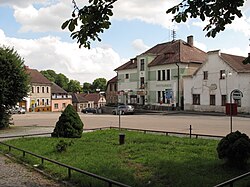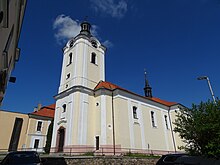| Divišov | |
|---|---|
| Market town | |
 Tyršovo Square Tyršovo Square | |
 Coat of arms Coat of arms | |
 | |
| Coordinates: 49°47′21″N 14°52′42″E / 49.78917°N 14.87833°E / 49.78917; 14.87833 | |
| Country | |
| Region | Central Bohemian |
| District | Benešov |
| First documented | 1130 |
| Area | |
| • Total | 30.99 km (11.97 sq mi) |
| Elevation | 466 m (1,529 ft) |
| Population | |
| • Total | 1,810 |
| • Density | 58/km (150/sq mi) |
| Time zone | UTC+1 (CET) |
| • Summer (DST) | UTC+2 (CEST) |
| Postal code | 257 26 |
| Website | www |
Divišov (German: Diwischau) is a market town in Benešov District in the Central Bohemian Region of the Czech Republic. It has about 1,800 inhabitants. It lies near the Sázava and Blanice rivers.
Administrative division
Divišov consists of eight municipal parts (in brackets population according to the 2021 census):
- Divišov (1,312)
- Dalovy (87)
- Křešice (27)
- Lbosín (76)
- Měchnov (61)
- Radonice (42)
- Šternov (70)
- Zdebuzeves (50)
Radonice and Zdebuzeves form an exclave of the municipal territory.
Etymology
The name is derived from the personal name Diviš, which is a Czech variant of the name Dionysus.
Geography
Divišov is located about 13 kilometres (8 mi) east of Benešov and 39 km (24 mi) southeast of Prague. It is located in a hilly landscape. The western part of the municipal territory lies in the Benešov Uplands and the eastern part in the Vlašim Uplands. Large part of the area is covered with forests. The highest points are the hills Březák and Vrchy, both at 533 m (1,749 ft) above sea level.
The confluence of the rivers Sázava and Blanice is located in Radonice part of Divišov.
History

The first written mention of Divišov is from 1130. The settlement was probably founded during reign of Bretislav I (1034–1055) by a member of Bretislav's retinue named Diviš. On the site of today's dean's building, there was a fortress around which a settlement began to form. Before 1242, Zdislav, the first-born son of Diviš of Divišov, founded Český Šternberk Castle in the neighbourhood of today's Divišov municipal territory, and the house of Divišov became the house of Sternberg.
In 1545, Divišov became a town. It received coat of arms with a gold star which reminded the lords of Sternberg. In 1742, after a large fire, almost the whole of Divišov burned down.
In the 19th and 20th centuries, development of industry occurred. In 1899, the construction of the railway line leading from Čerčany to Kolín was started. After Divišov lost its town status around 1960, it became a market town in 2006.
Jewish community
The first Jews allegedly settled in Divišov before 1685. The first mention of the presence of the Jewish population is from 1718. The Jewish community was established on 1 August 1776, and immediately after its establishment, it applied for the lease of land for the establishment of a cemetery, which was founded in 1777. The cemetery was used until World War II.
Demographics
|
|
| ||||||||||||||||||||||||||||||||||||||||||||||||||||||
| Source: Censuses | ||||||||||||||||||||||||||||||||||||||||||||||||||||||||
Economy

At the end of the 19th century, a factory for the production and processing of velvet was established here, and its products was appreciated even abroad. In 1948, Jaroslav Simandl founded a factory for speedway motorcycles of the Jawa brand.
Divišov is an industrial centre: beside Jawa, there is a transport company, a heavy machinery factory and an electronic equipment plant. Divišov also became known as a fish farming area.
Transport
The D1 motorway from Prague to Brno passes through the northern part of the territory.
Sport
There is a motorcycle speedway stadium in Divišov. It was opened in 1955 and hosts international races every year.
Sights

The main landmark of Divišov is the Church of Saint Bartholomew. It was built in the Baroque style in 1744–1746 and has a rich Baroque decoration.
The synagogue was built at the beginning of the 19th century. In 1854–1856, it was rebuilt to the Neoclassical style. After the building was used as a warehouse and hairdressing salon during the 20th century, it was returned to Jewish community of Prague in 1995. Since 2004, it serves as the Museum of the Life of the Jewish Community of Divišov.
The Jewish cemetery has an area of 2,921 square meters and 200 tombstones of the Baroque and Neoclassical type have been preserved, the oldest legible from the end of the 18th century. It is protected as a national cultural heritage and is gradually renovated.
The Church of Saint Martin is located in Měchnov. It is a Romanesque church from the first half of the 13th century. The tower was added probably around 1300. The church was later modified in the Gothic and Baroque styles, but retained its Romanesque character.
The Church of Saint Anne is located in Zdebuzeves. It was built in 1836, when it replaced an old Gothic church dedicated to Saints Simon and Jude.
References
- "Population of Municipalities – 1 January 2024". Czech Statistical Office. 2024-05-17.
- "Public Census 2021 – basic data". Public Database (in Czech). Czech Statistical Office. 2022.
- Profous, Antonín (1947). Místní jména v Čechách I: A–H (in Czech). p. 388.
- ^ "Historie obce Divišov" (in Czech). Místopisy. Retrieved 2021-07-01.
- ^ "Židovský hřbitov Divišov" (in Czech). Mizející památky. Retrieved 2021-07-01.
- "Historický lexikon obcí České republiky 1869–2011" (in Czech). Czech Statistical Office. 2015-12-21.
- "Population Census 2021: Population by sex". Public Database. Czech Statistical Office. 2021-03-27.
- "Divišovský plochodrážní stadion slaví již 60 let!" (in Czech). Deník.cz. 2015-05-28. Retrieved 2022-05-21.
- "Kostel sv. Bartoloměje" (in Czech). National Heritage Institute. Retrieved 2024-06-06.
- "Synagoga Divišov" (in Czech). Zajímavá místa. Retrieved 2021-07-01.
- "Kostel sv. Martina" (in Czech). National Heritage Institute. Retrieved 2024-06-06.
- "Kostel sv. Anny" (in Czech). National Heritage Institute. Retrieved 2024-06-06.